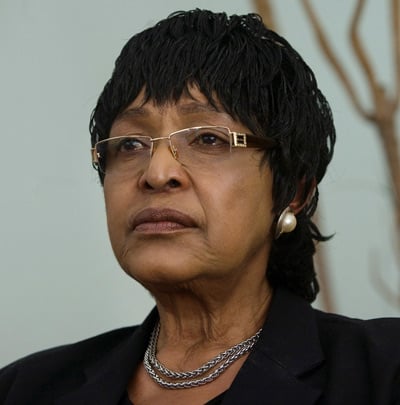Winnie Madikizela-Mandela is one of those people who knows an opportunity for publicity when she sees one.
When she isn’t lamenting the loss of the ANC’s soul, she’s warning President Jacob Zuma about pardoning former Vlakplaas commander Eugene de Kock, lest he rupture the bubble of peace that is South Africa’s 16-year-old democracy
Not so long ago, Caster Semenya‘s cornrows found a home on Winnie’s shoulder amid a public debate over her gender, and this week Winnie was on hand to witness Johannesburg’s metro cops shake hands with striking police reservists.
Her influence also ripples beyond South Africa’s borders, the most recent episode being her threat to sue the makers of biopic Winnie, because she hadn’t been consulted.

Twenty years ago, on February 11 1990, I watched as a young child as Winnie — wearing a black suit and an enormous smile — walked next to her husband for the first time in more than two decades. (Until only a few days prior to the big occasion, I hadn’t known who Nelson Mandela was, let alone what the importance of his release from prison would mean for South Africa.) This is the image of a woman who fought for what she believed in, and saw the positive side of things where few others could.
I knew very little about the struggle, as I did not come from a family where politics was discussed. I was in a different class to my white peers, but until then, I hadn’t known exactly what the reason for this was.
What confused me the most was the chanting, ululating and singing of freedom songs that seemed to celebrate the release of a man from jail, which until then I’d thought was only a place for criminals.
If South Africa was to become a nation of progress and prosperity, and the emancipation of black people was to become a reality, surely this was not the way to the light at the end of the apartheid tunnel. But then, what did I know? I was just a kid, and my curious nature and questions were often met with a harsh rebuke from my parents. If I was going to make sense of anything, it would be through reading as many newspapers as I could.
And this is what started my awareness of everything-Winnie in the media. In my eyes, she came to stand for everything that the struggle process was not. Where I’d only known of violent talk among township youth and what I sensed to be the continuous provocation of innocent white people, she epitomised the grace and dignified manner that only a woman who had waited almost three decades for her husband’s return from prison could.

I now realise that to fully appreciate Winnie’s complex character and capabilities, I should have started studying her earlier.
However, my view would gradually become distorted as she fell from grace.
I may not be thrilled with the Winnie I have come to know, but I’m glad I watched her important moment in the struggle, because it became mine too.